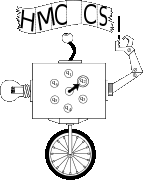Robots for autistic children
Colloquium
- Speaker(s)
- David Feil-Seifer
- Date
- Thursday, November 5, 2009
- Time
- 4:15 PM – 5:30 PM
- Location
- Galileo Pryne
This talk describes the design and implementation of a robotic system for interaction with children with autism spectrum disorders (ASD). The system consists of a robot and supporting infrastructure, including a “smart room”. The intent of this work is to explore and study the design of a therapeutic, minimally-restrictive environment that enables free-form human-human and human-robot interaction. Our primary design goals include: 1) using minimal structure with the participants in order to elicit natural behavior; 2) increasing a child’s social interactions while utilizing minimal human-operated technology; and 3) facilitating human-robot interaction while requiring the child to wear no more than the minimum needed for effective signal detection. The robot system implemented in this work uses non-invasive methods for sensing and interpreting the child’s behavior in order to interact with a child in free-form play while eliciting social behavior from the child. This talk will include results from two feasibility studies with chilren ASD in order to validate the effectiveness of the robot system. It will also discuss recommendations for the use of robot technology in ASD research settings.
Bio:
David Feil-Seifer is a PhD Candidate at the Interaction Lab at the Viterbi School of
Engineering (VSoE) at the University of Southern California. His
research focuses on socially assistive robotics (SAR), particularly
the study of Human-Robot Interaction (HRI) for children with autism
spectrum disorders (ASD). This project is a collaboration with the
Signal Analysis Interpretation Laboratory (SAIL), the Autism Genetic
Research Exchange (AGRE), Childrens Hospital of Los Angeles (CHLA),
and Prof. Peter Mundy of the UC Davis M.I.N.D. Institute.
Feil-Seifer graduated from the University of Rochester in 2003 with a B.S. in Computer Science. While there he was a founding member of the Undergraduate Robot Research Team, winner of the 2002 AAAI Mobile Host Competition. The team was advised by Prof. Chris Brown. In 2007, Feil-Seifer received a M.S. in Computer Science from the USC.
Feil-Seifer also worked with Maja Matarić and Nathan Koenig on The Robotics Primer Workbook. Designed for use in pre-university and university courses on robotics, this workbook is designed to compliment The Robotics Primer by Maja Matarić. This work was done in participation with iRobot and Microsoft Robotics.
